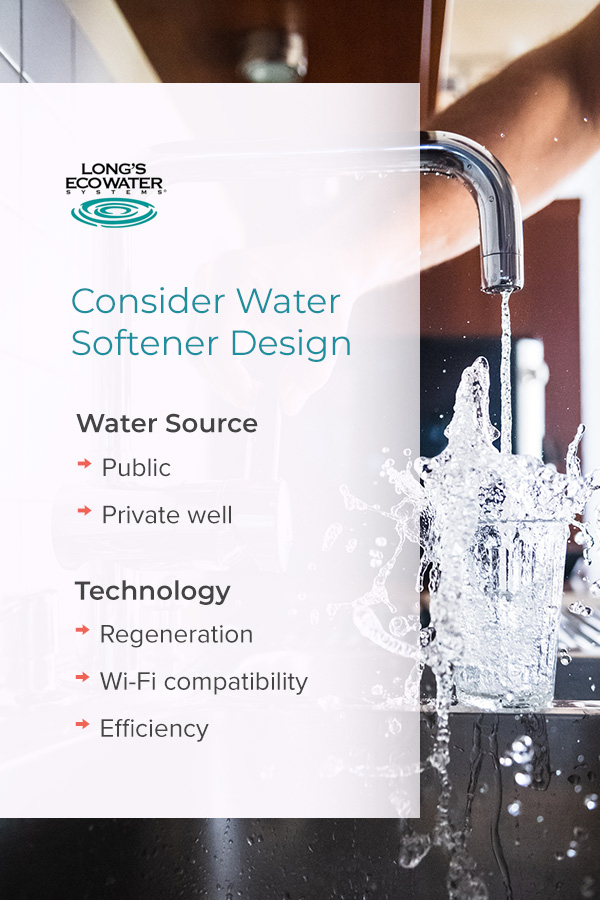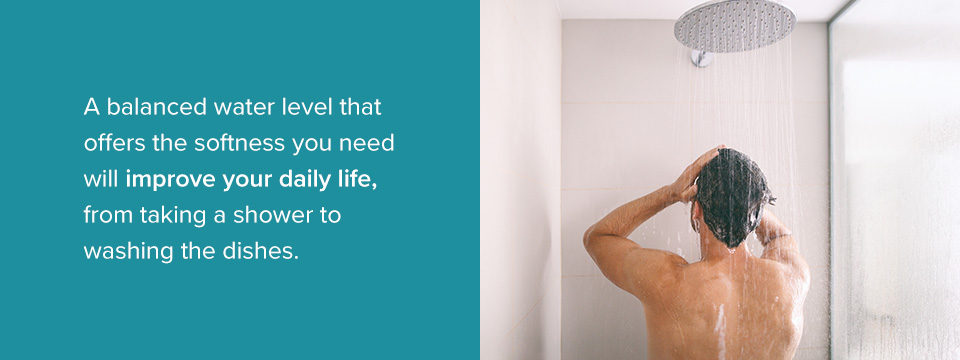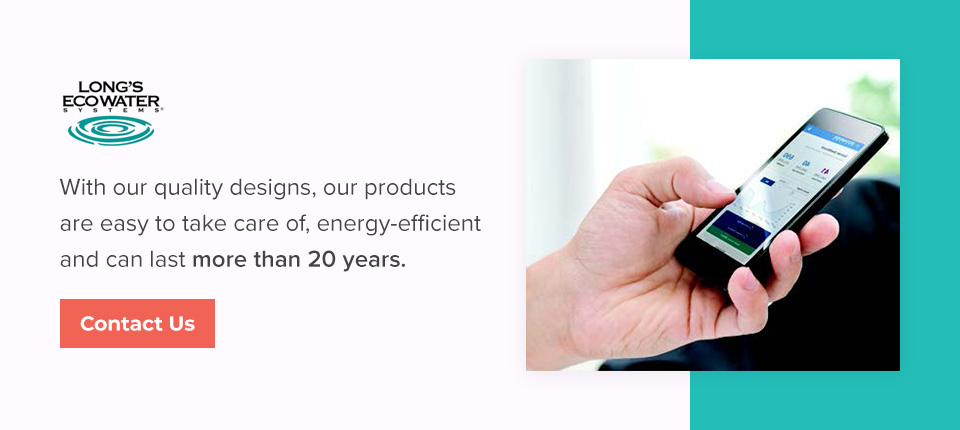
Water is one of the most essential parts of our lives — whether we’re washing dishes, doing laundry or taking a shower, we rely on its quality daily. Sometimes, your water may not be at the quality you want. If the hardness of your water reaches a certain point, you can start to notice. Water hardness can appear in a variety of different forms, including:
- Spotty dishware: Deposits of calcium carbonate can appear as spots on your dishware. If you keep unloading your glassware and are frequently seeing these spots, it could be a sign that you have hard water.
- Mineral stains: Hard water can also affect your clothes, producing mineral stains on fresh laundry. Because of the harshness of the water, clothes will tend to wear away quicker than when washed with soft water.
- Decreased water pressure: The mineral deposits in hard water can build up and leave residue in pipes, decreasing the amount of water that can get through at one time.
- Dry skin and hair: If you’re stepping out of the shower and notice that your skin or hair is feeling dry, this could be another signal that your water hardness is at a high level.
If you’re noticing these signs frequently, it could be time to look at a water softener. Finding the right filtration system can help alleviate these issues and get your water to a balanced level. Here are some steps you can take to help you choose a water softener.
Choosing Water Softener Size
One of the most important decisions you’ll have to make regarding your water softener is its size. The size of your water softener will depend on your water usage and the hardness of your water.
Examine Usage
How much water do you use? On average, one person uses around 80-100 gallons of water per day. A single-person household will use much less water than a family of seven, so it’s important to take stock of your unique situation to determine your usage. An easy way to find your usage is to multiply that average 80-100-gallon range by the number of people in your home.
A water service professional can also help you determine how much water you use.
Determine Hardness
After you determine usage, you’ll need to figure out how hard your water is. This is a measure of how much calcium and magnesium is in your water supply. If you use public water, you can often find out the hardness from your local water utility’s annual report. For those with private wells, it’s a good idea to have a professional service come and test your water.

Water hardness is measured in two ways — milligrams per liter (mg/L) and grains per gallon (GPG). General guidelines break up the hardness of water into different classes:
- Soft: Less than 17 mg/L or less than 1 GPG
- Slightly hard: 17-60 mg/L or 1-3.5 GPG
- Moderately hard: 61-120 mg/L or 3.5-7 GPG
- Hard: 121-180 mg/L or 7-10.5 GPG
- Very hard: More than 180 mg/L or more than 10.5 GPG
Calculate Size
Once you determine your usage and the hardness of your water, you’ll have the factors you need to calculate your water softener size.
Simply multiply your daily water usage by your water hardness to find your daily softening requirement. Make sure you’re using GPG for your water hardness. If you need to convert from mg/L, you can use a conversion calculator.
That final number will be the number of grains per gallon your water softener will have to eliminate each day. You’ll want to find a water softener size that can handle that capacity each week before regenerating.
As an example, suppose you live in a household with four people, each person using around 75 gallons per day. Your water hardness is at 10 GPG. You would make the following calculation: 75 (gallons) x 10 (GPG) x 4 (people in your household) = 3,000 grains per day used. Based on that calculation, a water softener that has a 20,000-grain capacity would regenerate after around 6-7 days if it doesn’t have automatic regeneration features.
For some extra help, here are some recommended water softener capacities for those that have three people in their household:
- 0-10 GPG: 24,000-grain capacity
- 11-20 GPG: 32,000-grain capacity
- 21-30 GPG: 40,000-grain capacity
Consider Water Softener Design

The design of your water softener is also very important. Much of this will depend on your specific situation. Here are a few aspects to keep in mind when it comes to choosing the design of home water softener systems:
Water Source
Where do you get your water from? Public water and private wells are likely your two options:
- Public: Maybe you’re looking to remove the chlorine that is added to public water — you’ll need to use a water softener that also refines.
- Private well: Well water often carries sediment other metals — you’ll want to find a water softener that can remove hardness and also those additional particles.
Identifying how you get your water will help you find the right water softener. You can also ask yourself what you’re looking for in your water softener. Although you’ll clearly want to soften your water, these products offer additional benefits, such as removing chlorine, sediment, and iron. Try to target the function you want in your water softener, and you can make the shopping process easier.
Technology
Water softeners today are using innovative technology to make your water just the way you want it. It can be beneficial to look at the various types of technology water softeners offer:
- Regeneration: This is a crucial part of a water softener. In the process of water softening, the water softener exchanges calcium and magnesium with salt. Once the system is done exchanging, it “regenerates” to replace old sodium ions with new ones. Many systems will automatically regenerate when needed to operate efficiently.
- Wi-Fi compatibility: Some water softeners can even connect to your Wi-Fi. You can access data and services from your smartphone, getting updates on water usage, system errors, and salt levels. This is a handy tool to have that will let you monitor and get great insight into the functioning of your softener.
- Efficiency: Great efficiency can help extend the life of your water softener while decrease waste water and salt use, so you’ll want to make sure you find a quality system. Some systems have twin tanks that can improve efficiency if you use more water than the average household.
Having innovative technology on your water softener offers convenience and will give you the confidence of knowing that your water softener is operating correctly.
How to Find a Reliable Water Softener Dealer
Size and design are extremely important when it comes to choosing the best water softeners, and you’ll also want to make sure you’re getting your product from a reliable, trusted service. As you go about finding the right company to provide you with a water softener, look for the following qualifications:
- Experience: A long history of work from multiple employees will add authority to a company. That long track record shows that they have stability and a deep knowledge of their industry.
- Testimonials: Positive reviews and testimonials will help build a picture of the company with specific customer experiences.
- Affiliations and certifications: Look for a company’s memberships in organizations, awards and certifications that help give it credibility.
Check out a company’s website to find out information that proves its credibility. If they’re a reputable organization, they’ll likely have most of this information — testimonials, experience and affiliations — already on their site.
What Type of Water Softener Do You Need?
There are different types of water softeners, so you should look into each type before you make a purchase. While all types will soften your water, each is suited to a specific situation.
You can separate some types of water softener systems by how they regenerate. Regeneration is when the water softener flushes out old sodium ions and replaces them with new ones. Regeneration falls into two categories:
- Timed: This type of regeneration occurs at the same time every day. Timed regeneration is great for households that follow a common routine.
- Demand control: Regeneration that automatically responds to the need for new sodium ions is called demand control. This is a very efficient method because it regenerates only when new ions are needed.
Other types of water softeners can be identified by their function. Refiners and conditioners, for example, are two types of water softeners that differ slightly based on what they accomplish:
- Refiners: If you use public water, you might want to look into getting a water softening refiner. These types of water softeners will soften your water and also remove the chlorine that is added to public water.
- Conditioners: For those with private wells, conditioners will likely work better for you. Conditioning water softeners remove hardness and sediment, iron and manganese. This added function is perfect for well owners who may often get extra sediment in their water.
If you’re still unsure about which type you’ll need, it can be beneficial to consult an experienced professional service that can walk you through your options and point you toward your ideal water softener.
Benefits of a Water Softener
Here are some of the advantages of installing a water softener in your home:
1. Enjoy Quality Water
Access to fresh and plentiful water is something we take for granted — it’s only when we don’t have it that we start to see its importance. A balanced water level that offers the softness you need will improve your daily life, from taking a shower to washing the dishes. Water is such a constant in our lives, and that’s why it’s so beneficial to get the best quality you can get.
You can purchase a water softener refiner for cleaner drinking water and a conditioner if you want some extra help with clearing out sediment. In both cases, you’ll be able to enjoy quality water.

2. Gain Confidence in Your Home
As a homeowner, you have to keep track of many aspects of your house — repairs, landscaping, electric bills — and worrying about your water is an issue a water softener helps you avoid. Since hard water can lead to more problems like clogged pipes, water heater issues, and dirty dishes, a water softener will free you up from those future issues and allow you to focus on other tasks.
Wi-Fi compatible technology can even let you track the status of your water softener from your smartphone, giving you valuable insight into how it operates.
3. Save Time and Money
Another benefit of installing a water softener is the amount of time and money you’ll save. Hard water can create a lot of problems in your home — some of them you might not even realize were being caused by hard water. Install a water softening system, and you can gain these advantages:
- Cut down on cleaning time: Hard water can contribute to those lingering spots on your glassware and dishes, forcing you to do extra cleaning to remove them. With a water softener, you can work to eliminate those spots and save time. Sometimes, hard water can also make it feel as though we can’t ever get clean, leading to longer showers and more water wasted. Soft water will provide a much better experience and make you feel cleaner quickly.
- Save money on repairs: Sediment deposits could block pipes and erode water heaters, leading to costly repairs. You can get in front of those repairs and prevent issues by investing in a water softener.
- Protect clothing and skin: No more spotted clothes or dry skin — soft water will offer quality without the harsh sediment that can leave lasting damage.
All of these advantages make buying a water softener a great investment for your home. You can save on future repairs, use less water, gain time back in your life and know that your water is safe for the entire household.
Your next step might be finding the ideal water softener for you. An experienced provider can show you what to know about water softeners, your various options and the best product for you. Long’s EcoWater Systems, Inc. is the reliable company you’re looking for.
Shop Long’s EcoWater Systems, Inc.
When you’re looking for quality water softeners for your home, Long’s EcoWater Systems, Inc. can offer you just what you need. With 70 years of service, we’re the oldest and most experienced water treatment business in the area. We’re water experts who offer you the highest quality and service. Shopping Long’s EcoWater Systems, Inc. has many advantages, including:
- Innovative technology: Our water softeners are Wi-Fi compatible, letting you stay updated on your system’s salt level, service needs, water usage and other crucial details. This valuable insight will ensure your water softener is working as it should, and you can address any maintenance needs as soon as they come up.
- Quality products: With our quality designs, our products are easy to take care of, energy-efficient and can last more than 20 years. EcoWater systems are effective — we use 25% less water and half the salt of other brands.
- Reliability: We stand by our work and ensure that we give you the highest quality products. That’s why offer a comprehensive warranty that symbolizes our commitment to that quality.
Long’s EcoWater Systems, Inc. is ready to help you find the ideal water softener for your situation. Shop our water softener products or consult our expert team to help you with your search!

